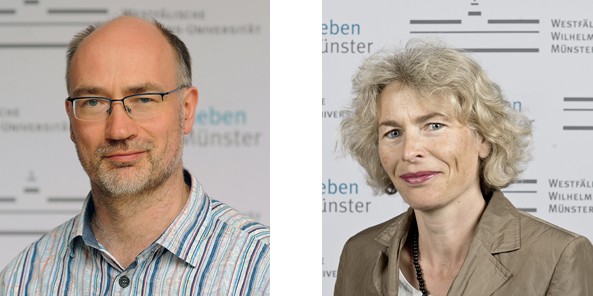
"Human Frontier Science Program" funds two projects involving Münster University researchers
No fewer than two of the prestigious “Program Grant” research awards given by the international “Human Frontier Science Program” (HFSP) go to members of the Department of Biology at the University of Münster. Bioinformatics specialist Prof. Erich Bornberg-Bauer and cell biologist Prof. Karin Busch are to receive funding, set to run for three years, for research projects which they are each undertaking in collaboration with teams of international researchers.
The selection procedure for HFSP funding is highly competitive. Out of 770 applications originally submitted by researchers from over 50 countries, 31 are now being funded after a selection procedure held in several stages – eight in the “Young Investigator Grants” funding line, and 23 in the “Program Grants” line. The “Program Grants” are awarded solely for especially innovative projects dedicated to research into complex mechanisms in living organisms. The researchers in the teams must contribute different types of expertise which complement one another, and they need to be exploring uncharted territory. Each team member receives between $110,000 and $125,000 per year for three years, the equivalent of around € 300,000 in total.
Erich Bornberg-Bauer from the Institute of Evolution and Biodiversity at Münster University receives the funding together with researchers from South Africa, the USA and France. The team of four is studying termite queens, which have a particularly long life, to see how what they eat affects their ageing process. Among the things the researchers will be analysing are intestinal bacteria and molecular signalling pathways, using methods of genome and proteome analysis in the process, which means they will be examining the entire genetic material and all the proteins. Genome expert Bornberg-Bauer, who is now receiving an HFSP Grant for the third time, will be searching in the termites’ genetic material for the molecular bases for the termite queens’ longevity. Not long ago, his team sequenced and analysed the first termite genome. Recently, it also took a leading role in a study which, for the first time, made a detailed comparison of the genetic material of termites and cockroaches. These data will now form the basis for further analyses.
Karin Busch from the Institute of Molecular Cell Biology will be working with researchers from Spain, the USA and Switzerland to study a peculiarity which occurs during the so-called oxidative phosphorylation process. This process is part of energy metabolism. What is unusual about it is that the oxidative phosphorylation is controlled by two sets of genetic material – not only genetic information from the cell nucleus, but also the so-called mitochondrial DNA, contribute to this controlling process. This interaction evidently has a retroactive effect on the “expression”, or activity, of the genes in the cell nucleus: instead of the usual diploid gene expression, a haploid expression takes place – in other words, one gene copy is immobilized. From an evolutionary point of view, this is surprising, as any haploid gene expression increases the risk of mutations and diseases. What the researchers want to study is whether – and, if so, under which conditions – it may be necessary for organisms to establish a haploid gene expression, despite the risks involved. In the process, Karin Busch, a team leader at the Cells-in-Motion Cluster of Excellence at Münster University, will be analysing in particular the dynamic molecular processes which take place during oxidative phosphorylation in the mitochondria of the cells.
